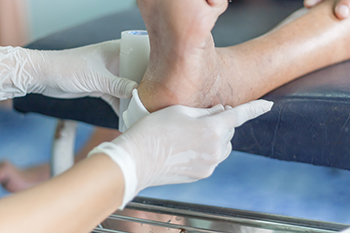

Managing cuts on the bottom of the feet, which requires prompt and careful attention to prevent infection and promote healing, is often done by a podiatrist. This type of doctor will start by cleaning the wound thoroughly with mild soap and water to remove any debris and reduce the risk of infection. This is generally followed by gently patting the area dry with a clean cloth or gauze. The doctor will then apply an antiseptic to the cut to further disinfect the area, and cover the wound with a sterile adhesive bandage or dressing to protect it from dirt and friction. The dressing will be secure but not too tight, allowing for comfort and breathability. Regularly changing the dressing and monitoring the cut for signs of infection, such as increased redness, swelling, or discharge will be recommended. If you have a cut on the bottom of your foot, it is suggested that you schedule an appointment with a podiatrist who can offer you effective treatment.
Wound care is an important part in dealing with diabetes. If you have diabetes and a foot wound or would like more information about wound care for diabetics, consult with Dr. Stephan J. LaPointe from Georgia Foot & Ankle Specialists . Our doctor will assess your condition and provide you with quality foot and ankle treatment.
What Is Wound Care?
Wound care is the practice of taking proper care of a wound. This can range from the smallest to the largest of wounds. While everyone can benefit from proper wound care, it is much more important for diabetics. Diabetics often suffer from poor blood circulation which causes wounds to heal much slower than they would in a non-diabetic.
What Is the Importance of Wound Care?
While it may not seem apparent with small ulcers on the foot, for diabetics, any size ulcer can become infected. Diabetics often also suffer from neuropathy, or nerve loss. This means they might not even feel when they have an ulcer on their foot. If the wound becomes severely infected, amputation may be necessary. Therefore, it is of the upmost importance to properly care for any and all foot wounds.
How to Care for Wounds
The best way to care for foot wounds is to prevent them. For diabetics, this means daily inspections of the feet for any signs of abnormalities or ulcers. It is also recommended to see a podiatrist several times a year for a foot inspection. If you do have an ulcer, run the wound under water to clear dirt from the wound; then apply antibiotic ointment to the wound and cover with a bandage. Bandages should be changed daily and keeping pressure off the wound is smart. It is advised to see a podiatrist, who can keep an eye on it.
If you have any questions, please feel free to contact our office located in Rome, GA . We offer the newest diagnostic and treatment technologies for all your foot care needs.